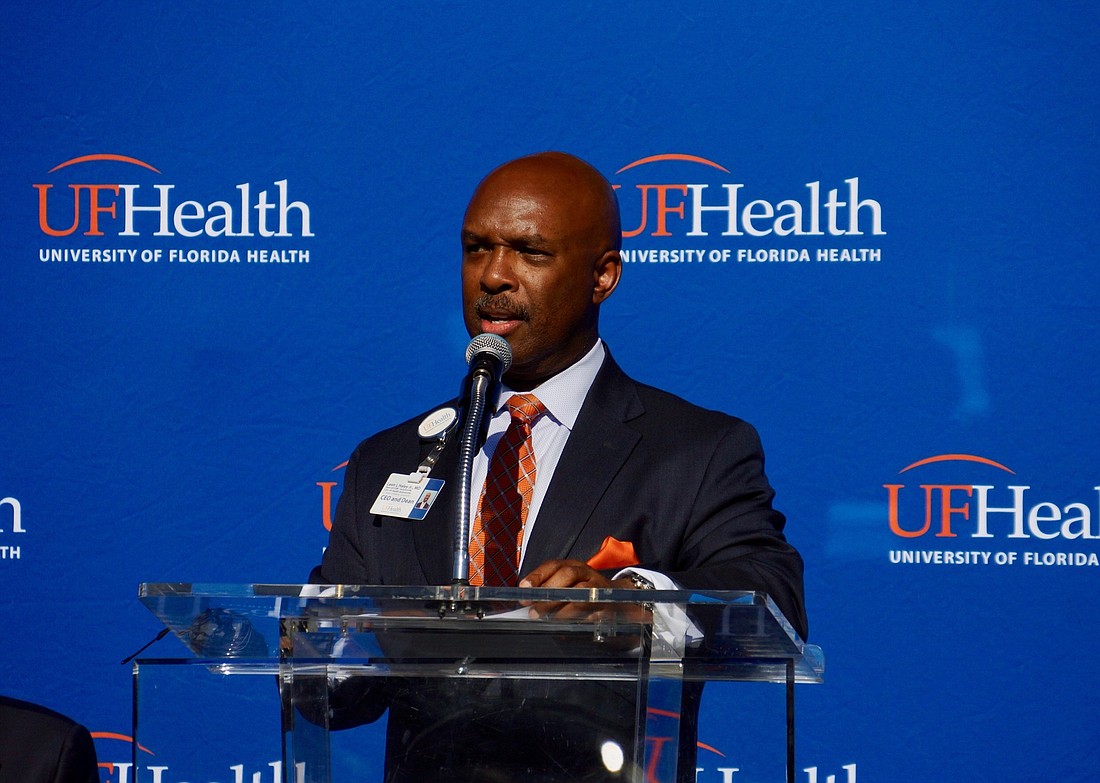
Following a challenging 2020, area hospital leaders hope to normalize operations on their campuses as COVID-19 cases decline and vaccines are distributed.
“We’ve spent the last several months managing COVID,” said Dr. Leon Haley, CEO of UF Health Jacksonville.
“Now we’ve shifted into managing COVID recovery and vaccine distribution to the degree we’re able to participate in that process while still maintaining our focus on our strategic initiatives.”
UF Health Jacksonville is the third-largest hospital in Northeast Florida with 462 beds, according to 2019 Agency for Healthcare Administration data, the latest available, on Florida hospital finances. Eighteen area hospitals are listed in the data in Duval, St. Johns, Nassau, Clay and Baker counties.
Haley said some of the main focuses in 2021 for UF Health Jacksonville include managing remaining COVID-19 cases, vaccinating, increasing surgery and clinic visit volumes, planning for physical growth and engaging with the community.
The hospital opened both of its facilities in Wildlight in the past year, a YMCA and rehabilitation center and a medical office building. Haley said UF Health is looking at other possible expansion opportunities along Interstate 95, through its rehabilitation service line and possibly at its campus in North Jacksonville.
In addition to routine maintenance at its main campus in Springfield, Haley said he wants to add an education and research building there to “support a regional medical campus.”
It also will explore locations outside the hospital base for primary care offices and other ambulatory services, focusing on expanding beyond its campuses.
“We don’t want very hospital-centric things,” Haley said. “We want to make sure we have ambulatory clinics to support the patient population.”
UF Health’s use of telemedicine skyrocketed during the peak pandemic to about 1,500 to 2,000 virtual appointments a day.
While that number is down to about 300 a day, Haley said the hospital has “a very aggressive telehealth initiative.”
“You’re going to see us coming out of the pandemic focusing on telehealth, digital health, use of data analytics and ambulatory strategies,” he said.
Haley said hospital admissions still are lower than historical levels. Emergency room admissions are down about 15%, and pediatric visits are down even more, he said. Overall admissions are down 8%.
The hospital is working to communicate with its patients that the hospital is a safe place to be, and encouraging people not to delay care.
Haley said he also is focused on communicating with his staff, managing day-to-day operations while working on longer-term initiatives.
“As a leader during moments like this, it’s also trying to make sure people understand the strategic initiatives,” he said.
“We still want to be able to do those and get out of the pandemic and be the organization we want to be.”
Baptist Health
Baptist Health CEO Brett McClung said its goals are similar, but that the organization will refocus its attention to a five-point strategic plan the hospital completed a few months before the pandemic.
Those five points are growing for the future, integrating the system, caring for the consumer, advancing the Baptist Health way and advancing clinical care.
Baptist Health Jacksonville, the system’s Downtown campus, is the region’s largest with 624 beds. Baptist Medical Center Beaches has 146 beds and Baptist Medical Center Nassau has 54. Baptist Medical Center South was not listed in the 2019 AHCA data.
The hospital system put some of its physical expansions on hold because of the pandemic.
Work continued on the Wolfson Children’s Hospital Critical Care Tower, expected to be completed early next year.
That included the $200 million, 100-bed Baptist Clay hospital in Fleming Island. Construction was slated to begin in April 2020, but was delayed until December. McClung said it will open in fall 2022.
McClung said the pandemic inspired a few design changes to the hospital. The building’s fourth floor will have air filtered from the outside to help prevent the spread of airborne germs, and more touchless features will be incorporated throughout the building.
Baptist also launched its HealthPlace on Demand app last fall. It offers telemedicine services to patients, connecting them to ER or family medicine doctors 24/7.
“We really have to lean into digital first for everything,” McClung said. “Whatever it is, consumers want to be able to access it virtually. We’re designing and producing cool things in there and we’ll continue to do that work.”
Like at other institutions, McClung said Baptist’s ER volume is about 85% to 90% of what it has been historically.
Baptist also is “standing by and nimbly available” to distribute COVID-19 vaccinations when more supply becomes available, he said.
The hospital system has distributed 40,000 vaccines since December and has the capacity to administer 2,700 shots a day.
Despite the challenges COVID-19 posed to hospital systems in 2020, McClung said there were positives.
“I think the world has a better understanding of the courage, the tenacity and the passion of people who work in health care.”